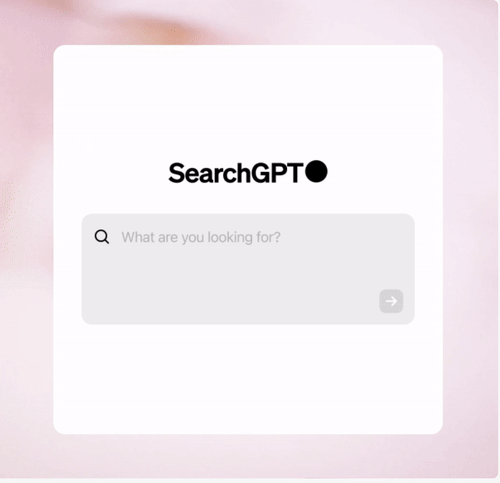
TL;DR Summary
Effortless Searches: SearchGPT organizes and summarizes information, making tasks like trip planning and research quick and easy.
Smart Features: It provides concise answers with direct links and visual content, enhancing your search experience.
Exciting Future: OpenAI plans to integrate SearchGPT into ChatGPT, promising seamless, real-time assistance in daily life.
Estimated reading time: 3 - 4 minutes.
Picture this, you're frantically planning a last-minute trip to Boone, North Carolina, in August 2024. You need to know which music festivals are happening, what the weather will be like, and the best places to stay.

We’ve all been there—spending precious minutes (or hours) navigating through endless search results, trying multiple keywords, and still not finding what we need.
Whether you're a student rushing to meet a deadline, a traveler planning a trip, or just someone curious about the latest trends, the frustration is real.
Enter SearchGPT
Normally, you'd spend hours sifting through endless search results, but with SearchGPT, it's as easy as asking a friend.
This AI-powered search assistant is designed to make your life easier. Instead of just giving you a plain list of links, SearchGPT organizes and makes sense of the information, presenting it in a way that’s easy to digest.
Take the example of looking up music festivals in Boone. SearchGPT doesn’t just list festivals; it summarizes key details, gives short descriptions, and provides direct attribution links.
Need the best brunch spots in town? SearchGPT’s got you covered. Writing a research paper and need credible sources? SearchGPT’s on it. Plus, with clear and direct links to sources, you can trust the information you’re getting.
It’s like having your own personal event planner and researcher rolled into one. And if you're wondering when to plant tomatoes, SearchGPT will not only tell you the best time but also explain different varieties and how to care for them.
The best part? SearchGPT builds on each query, understanding the context of your questions like a real conversation. It’s like having your very own personal research assistant who never sleeps.
You can ask follow-up questions or click on the sidebar to explore other relevant links. There’s even a feature called “visual answers,” showcasing AI-generated videos and images, although OpenAI is still fine-tuning this aspect.
Now I have to admit, the concept of an AI-powered search engine has always intrigued me. It's like something straight out of a sci-fi novel. But with SearchGPT, we're not just talking about any search engine.
We're talking about a tool that not only finds information but also makes it digestible and relevant. It's a game-changer, especially for those of us who value our time and productivity.
However, as with any new technology, there's a part of me that wonders about the implications. How will this affect traditional search engines? What about the accuracy of information?
And most importantly, how will it balance the need for quick answers with the integrity of sourcing? These are questions that we'll need to keep an eye on as SearchGPT evolves.
In the Words of Industry Leaders
Nicholas Thompson, CEO of The Atlantic, puts it perfectly:
AI search is going to become one of the key ways that people navigate the internet, and it's crucial, in these early days, that the technology is built in a way that values, respects, and protects journalism and publishers.
OpenAI has taken great care to address concerns from publishers. They’re working with partners like The Wall Street Journal and Vox Media to ensure that high-quality content is highlighted and properly attributed.
Publishers also have control over how their content appears in SearchGPT and can opt out of having their content used for training AI models while still being included in search results.
What's Next?
Releasing its search engine as a prototype helps OpenAI in a few different ways. First, if SearchGPT’s results are wildly incorrect—like when Google rolled out AI Overviews and told us to put glue on our pizza—it’s easier to say, well, it’s a prototype!
There’s also potential for getting attributions wrong or maybe wholesale ripping off articles like Perplexity was accused of doing.
OpenAI is constantly improving SearchGPT, aiming to integrate the best features into ChatGPT for a seamless experience into our daily lives.
Imagine asking ChatGPT about the nearest coffee shop, the latest news, or even the history of AI, and getting an instant, accurate response.
It's not a far-fetched idea to see a world where SearchGPT is seamlessly integrated into our daily lives.

Source: OpenAI - Visual results for richer understanding
You wake up, ask your AI assistant for the day's schedule, get real-time updates on your commute, and even receive suggestions for dinner based on your fridge's contents.
It's not a far-fetched idea of a future, and it's both exciting and a little daunting. But hey, that's the beauty of technological advancement, right?
Now if you would like to experience the future of search, then sign up for the SearchGPT waitlist today and be among the first to try this groundbreaking prototype.
Don’t miss out on the chance to get a taste (whether it's mind-blowingly good or horrendously bad) of this new technology and revolutionize how you search the web!
See you in the next one,
Aaron



